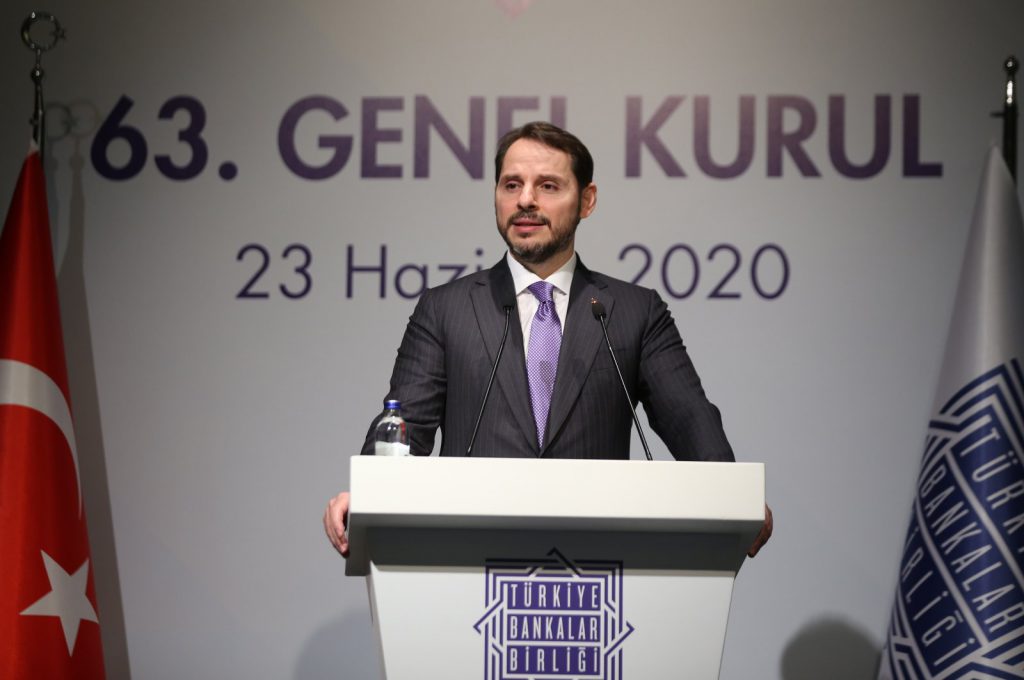Addressing the general assembly of the Banks Association of Turkey in Istanbul, treasury and finance minister Albayrak claimed Turkey is anticipated to come out of the coronavirus-driven crisis with a V-shaped recovery and will converge its potential growth.
“Leading indicators from June give positive signals for an improvement in the economy,” Albayrak said, citing growth in domestic demand and increases in consumer confidence as well as a jump in the country’s Purchasing Managers’ Index (PMI).
“The early measures taken to counter the pandemic have reflected positively on the economy. We have been among the countries least affected by the pandemic. We have started to see the recovery together with the normalization process,” the minister said.
Albayrak reminded that Turkey’s exports increased by 24.6% in the first 21 days of June compared with the same period of last year, according to data from the Turkish Exporters Assembly (TİM). Considering the PMI figures the European Union announced in the morning, he said they also reveal that the recovery in June is also strong with Turkey’s trading partners. Albayrak also referred to the capacity usage in the manufacturing industry that rose to 62.6% in May up from 61.6% in April; the economic confidence index that elevated from 54.9 in April to 59.5 in May and to 62.6 in June. The country’s Purchasing Managers’ Index (PMI) for the manufacturing sector rose to 40.9 in May, up 7.5 points from 33.4 in April, the minister added.
Turkey will get closer to its potential growth in a short period of time by “coming out from this process with a V-shaped recovery via deferred demand, improvement in expectations and measures taken by stimulus packages,” he argued.
Turkey started to ease restrictions aimed at reviving the economy as of May and further relaxed them at the beginning of June as it advanced in its fight against COVID-19.
The upcoming employment package
Albayrak added that the employment package that the government is working on will add to the recovery process in the coming period. Ankara earlier this month said it was working on a comprehensive employment shield package to support jobs affected by the pandemic, with support also on the way for industries to maintain export and production-oriented growth to revive the economy amid the outbreak.
The government also recently announced it would extend the three-month ban on layoffs that were imposed in April for another three months to offset shuttered businesses and unemployment.
The minister also announced that applications for housing loans, enhanced by packages recently introduced by the country’s three public lenders, have exceeded 133,000 and that over 100,000 citizens took out loans under the low-interest mortgage campaign with total placements at around TL 25 billion. Ziraat Bank, VakıfBank and Halkbank extended four new loan packages on June 1 to invigorate the transition to post-coronavirus normality and revive social life.
The packages include mortgages for new houses and loans for vehicle purchases, locally manufactured goods and holiday expenses at annual interest rates running below inflation. Mortgages for new homes will have up to 15 years of maturity, with interest rates as low as 0.64% and a grace period of up to 12 months.
In addition to the central bank’s monetary policy and strong interest rate cut decisions, Albayrak said, interest rates declined and credit growth continued its strong course, especially as the public banks continued to meet the credit needs of the real sector with low-interest loans.
“The annual growth of the total exchange rate adjusted loans, which gained momentum in the first quarter of 2020, was also strong in May, reaching 27.3%,” he added. “When we look at credit expenditures, credit card expenditures and consumption expenditures, we see that this trend continued upward in May and June, compared to March and April.”
Strong messages to banks: Speed up restructuring of loans
“The banking sector has a very healthy outlook with its strong capital structure, high asset quality and profitability rates,” Albayrak said.
As of April, the industry’s annual return on equity is around 11%, he noted. In the same period, the legal minimum with a capital adequacy ratio of banks is 18.6%, much above the 8% threshold, he said. Reminding such figures, Albayrak is urging private banks to extend more loans to the real ector companies.
He also proposed the banks to revisit their old practices and refresh themselves to adapt to the changes in the post-virus era.
“We expect you (banks) to perform work more compatible with the development goals of our country,” he stressed, asking the lenders not to prioritize short-term profitability.
Albayrak advised banks to speed up the restructuring of loans and said the government would support the formation of an asset management company to take on loans of problematic companies from all banks; meaning the state will not be taking over the bad loans as was the case back in 2001 crisis.
